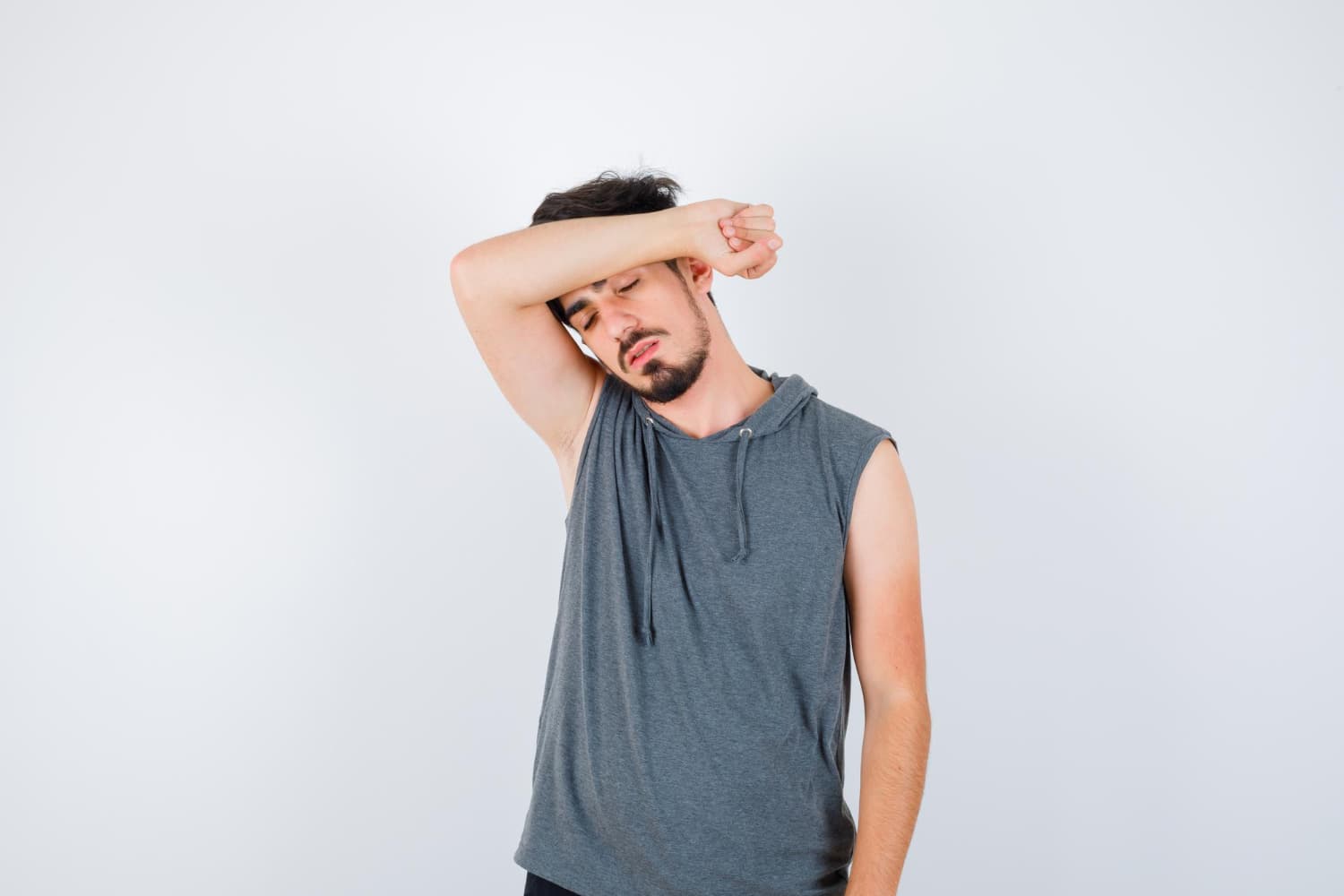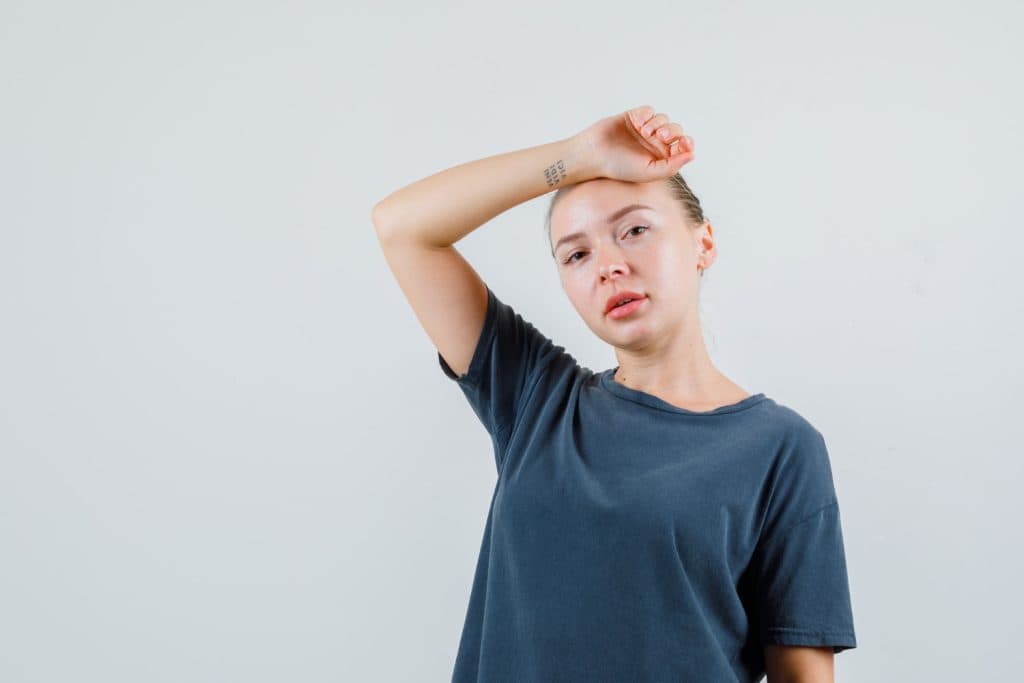Back to blog
Body Odor and Excessive Sweating: Causes and Treatments

Why Does Body Odor Happen?
How Does the Body Secrete Sweat?
Hyperhidrosis and Bad Body Smell Causes
What Causes a Bad Body Smell That Is Stronger than Usual?
Foods for a Pleasant Body Scent
When Should You See a Doctor?
Healthy Food Delivery
How Does the Body Secrete Sweat?
Hyperhidrosis and Bad Body Smell Causes
What Causes a Bad Body Smell That Is Stronger than Usual?
Foods for a Pleasant Body Scent
When Should You See a Doctor?
Healthy Food Delivery
Sweating is part of your everyday life. It helps you cool down, flush out toxins, and keep your body in balance. The problem starts when the sweating is too much or comes with an unpleasant smell. You might worry about sweat marks on your clothes, damp hands before a handshake, or body odor after exercising. These moments can affect how comfortable you feel throughout the day and even shake your confidence , but you’re not the only one dealing with this.
Your body odor can change for many reasons. Puberty, excessive sweating, and poor hygiene are common causes, but your environment, certain foods, or some medications can also play a role. Everyone has their own natural scent, and it can be mild or even pleasant. But if you notice a sudden or constant change in your smell, it could be a sign that something in your health needs attention.
In this guide, you’ll get a clear understanding of what causes excessive sweating and body odor, the habits that make them worse, and natural solutions and practical tips you can start using right away to feel more comfortable and regain your confidence.
Why Does Body Odor Happen?
Sweat doesn’t actually have a smell. The odor shows up when bacteria on your skin break down parts of your sweat, like proteins and fatty acids. That’s what creates the scent you recognize.
Sweating itself plays an important role in keeping your body balanced. It’s your built-in cooling system. When your internal temperature rises, whether from exercise, hot weather, or stress, your sweat glands become active and release fluid onto the surface of your skin. You might even notice sweating in unexpected areas like your face, scalp, or hands. As the sweat evaporates, your body cools down and returns to balance.
How Does the Body Secrete Sweat?

Sweat glands sit throughout your skin and connect to the surface through tiny ducts. When sweat reaches the outside, it evaporates and helps cool your body so your temperature doesn’t rise to dangerous levels.
But sometimes your body produces more sweat than it actually needs, it’s a condition known as hyperhidrosis. You might notice sweat even when you’re resting, in cold weather, or in situations that wouldn’t normally trigger it. This usually happens because the sweat glands are overactive.
To understand this better, it helps to know that you have two main types of sweat glands, each playing a different role in cooling and odor:
- Eccrine glands: these are spread across most of your body. They produce clear, odorless sweat that mainly helps regulate body temperature.
- Apocrine glands: these are found in areas like your armpits and groin. They release a thicker type of sweat that mixes with the natural bacteria on your skin, and that’s where most body odor comes from.
Hyperhidrosis and Body Odor Causes
Wondering why you sweat too much or notice a strong body odor?
Some people naturally sweat more than others, with or without odor. In certain cases, this is called hyperhidrosis. Here are the most common reasons behind it:
Clothing
Some fabrics can trap sweat and make body odor worse, especially materials like certain types of polyester that don’t let your skin breathe. Wearing damp clothes has a similar effect. Moisture creates a perfect environment for bacteria to multiply, and once you start sweating, the odor becomes noticeable.
Genetic Factors
This is usually the least worrying cause. If there’s no underlying medical issue, healthy daily habits can often improve the situation and help your body respond differently over time.
Heat and Exercise
Sweating helps cool your body during intense activities like cardio, resistance training, or running. That’s why it’s important to shower right after a workout. But if you feel exhausted and start sweating from every small efforts, it’s best to check in with a doctor.
Psychological Stress
When you’re stressed or anxious, your sympathetic nervous system becomes active, which can make you sweat more than usual. This reaction triggers your sweat glands, especially the eccrine glands found all over your body, to work harder, leading to excessive sweating for some people.
Hormonal Changes
Your body goes through different stages that affect hormone levels, which in turn influence sweating and body odor. During puberty, your eccrine sweat glands become more active, which is why teenagers often notice stronger body odor than before.
It doesn’t stop there, hormonal changes during pregnancy can increase sweating and even change its nature. Later, during menopause, fluctuating estrogen levels can cause hot flashes and night sweats. These hormonal shifts directly impact how your sweat glands function and can make body odor more noticeable.
*You can read about Understanding the Signs of Breast Cancer in Women and Men.
Diet and Food Types

Eating unhealthy foods like fast food, sugary treats, and processed foods filled with oils, artificial colors, and preservatives can increase bacterial activity, which may lead to more sweating, especially when you consume a lot of sugar.
Even if you maintain a healthy diet, some natural foods can still trigger your sweat glands. Onions, garlic, and spicy or very hot foods are common examples. It’s also best to limit simple carbohydrates like white bread, since they often contain added sugars and other ingredients that can affect your body’s balance.
Medical Conditions
Excessive sweating can be linked to health problems such as thyroid problems, diabetes, or infections. If your sweating seems excessive, feels unusual, or doesn't feel normal, it's best to consult a doctor.
What Causes a Bad Body Smell That Is Stronger than Usual?
Your body odor isn’t caused by sweat alone, several other factors play a big role. The balance of bacteria on your skin, for example, differs from person to person. Some people naturally have more odor-causing bacteria, which can make their body odor stronger. What you eat also matters. Foods rich in sulfur, like garlic, cabbage, and broccoli, can make your odor more noticeable than you might expect.
Your clothing choices matter too. Synthetic fabrics tend to trap sweat and bacteria, while natural materials like cotton let your skin breathe and help reduce odor. Good hygiene is just as important, skipping showers or not washing thoroughly can make body odor worse, especially in hot weather or after heavy sweating.
Bad Body Odor Treatment

Your daily habits influence every part of your physical and mental well-being. The way you live can also help manage excessive sweating and prevent uncomfortable or embarrassing moments, especially on hot summer days or humid winter ones. Some of the lifestyle choices that can make a difference include:
Choosing Your Clothing
Your clothing choices can make a big difference when it comes to managing sweat. Wearing breathable fabrics like cotton or moisture-wicking sportswear helps your body release sweat more naturally, allowing it to evaporate instead of soaking into your clothes.
This keeps you feeling fresher and more comfortable throughout the day. Even color matters, darker shades can hide sweat stains better, helping you feel more confident if you’re concerned about visible marks.
Bathing and Hygiene
Regular bathing helps remove sweat and bacteria, even if that means showering twice a day. Some habits can actually make body odor worse, such as using non-medicated commercial products, keeping your shower sponge in a damp area, or not replacing it often enough.
If you’re dealing with strong body odor or excessive sweating, try using a medicated wash with salicylic acid as it helps clear pores, reduce bacteria, and remove built-up oils from your skin.
Avoid using sponges on sensitive areas like your armpits, since bacteria on these items can worsen odor. Instead, apply the medicated wash with your hands and gently clean the area. You can also use it on your face to control sweat, but be careful and keep it away from your eyes.
Shaving or Trimming
Shaving can sometimes lead to increased bacterial growth, especially if you have sensitive skin. You may have noticed small white bumps after shaving. This irritation can damage the skin and make body odor worse, particularly if the razor isn’t properly cleaned or sterilized.
To reduce these issues, consider safer hair removal options, such as razors that remove hair from the root, gentle hair removal creams (as long as they suit your skin), or the longer-lasting and more hygienic option of laser hair removal.
Drink Enough Water
Drinking plenty of water helps flush out toxins from your body and is one of the simplest ways to reduce excessive sweating. For an extra refresh and detox boost, try adding cucumber, lemon, or mint to your water.
Exercise Intensively
Intense exercise helps your body release built-up sweat and toxins. Activities like brisk walking for an hour, jogging, or doing cardio and HIIT workouts are great options. Try to work out intensively about three times a week, and on other days, do lighter exercises such as yoga or stretching to keep your body active and balanced.
Other Treatment Methods

If you deal with extra sweating during occasions like job interviews or events, there are a few practical things you can do to manage it and reduce odor:
- The most effective deodorant for body odor is medical deodorant that’s free of alcohol and aluminum.
- Apply coconut oil daily on clean skin, and try not to cover the area with clothing right after.
- Dab a bit of natural lemon juice or apple cider vinegar about 10 minutes before you shower.
- Use tea tree oil on clean skin, it helps because it’s antimicrobial.
- If your body can handle it, occasional sauna sessions can help release trapped sweat.
- Skip sugary snacks in the morning and drink unsweetened mint tea to help cleanse your system. A cup of green tea before an event can also help.
- Exfoliate regularly with safe body scrubs or go for a Moroccan or Turkish bath once in a while to remove dead skin and improve body odor.
- Don’t wear the same clothes twice without washing them, even if they don’t smell. Bacteria can still be there.
- After showering, make sure clothes and towels are aired out. Wash your bedsheets and pillowcases every two to three days, and open the windows so sunlight reaches your room to keep moisture and odor away.
- Choose shoes that let your feet breathe.
Foods that Give You Good Body Odor
What you eat can influence how much you sweat and how your body smells. These tips can help:
- Choose water-rich fruits and vegetables like cucumbers, watermelon, and oranges to keep your body hydrated.
- Add herbs like parsley, mint, and coriander to your meals, they help reduce bad body smell.
- Drink green tea for its antioxidants, which support your body’s natural detox process.
- Cut back on dairy and cheese, and stick to natural options when you do have them. Avoid processed cheeses like yellow cheddar. Also, limit spicy foods, onions, garlic, and alcohol if you notice they make your odor stronger.
- You can add a little orange blossom water or rose water to your drinking water for a refreshing touch.
When Should You See a Doctor?
If you're sweating so much that you have to change clothes several times a day, or you see sweat dripping from your hands or feet even when you're resting, you might be dealing with a condition that needs medical evaluation.
In these cases, treatments like prescription antiperspirants, Botox injections, or other minor procedures from your doctor can help. Make sure to see a specialist if you notice any of the following:
- Your sweating suddenly becomes excessive.
- It starts to interfere with your daily activities or routine.
- You experience night sweats that aren’t related to heat.
- The sweating comes with other symptoms, such as unexplained weight loss or a rapid heartbeat.
Healthy Meal Delivery
A healthy diet can make a big difference in many health issues, including excessive sweating. When you cut back on hydrogenated oils, sugar, and processed foods, you support your energy levels, appearance, and body odor, which also boosts your confidence.
If you want an easier way to stay consistent, the Calo app can take the pressure off. It offers daily or monthly meal plans with satisfying, flavorful dishes delivered to your home or workplace. You can also talk to the app’s nutrition experts to choose the plan that fits your diet and enjoy your meals and snacks without the hassle.
FAQ
What are the reasons for bad breath and is it related to body odor?
Bad breath can come from several causes, including:
- Stomach-related odor: this can happen due to a stomach infection or eating a lot of foods like garlic, onions, and strong spices.
- Gingivitis: you might not notice light bleeding in your gums, but it can cause foul breath.
- Too much white bread and baked goods: yeast in items like white bread, cakes, and pies can make breath smell stronger and unpleasant.
- High sugar intake: sugar can worsen bad breath.
- Poor oral hygiene: brushing your teeth at least twice a day, especially before bed, is essential since your mouth stays closed while you sleep.
How can I make my body smell good from the inside?
Through exercise, eating healthy foods, and drinking plenty of water.
Does eating spicy food cause body odor or not?
Yes, consuming excessive spicy food can increase body odor.
Knowing what causes excessive sweating and body odor makes it easier to fix. Often, the solution is just changing habits, not spending money. For more topics, like retinol benefits or the healthy summer bucket list, visit the Calo blog.








